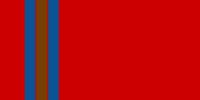Difference between revisions of "Human rights in Rakeo"
| Line 12: | Line 12: | ||
=Religious persecution= | =Religious persecution= | ||
Rakeo does not permit foreign priests of any religion enter the country, and carrying religious material into the country is heavily discouraged. While the country is not state-atheist, it's historical struggles in balancing power between religious and secular authorities have lead to greatly diminished religious freedoms. In addition, the Rakeoian Catholic Church and its members also polices religion within areas of majority control. | Rakeo does not permit foreign priests of any religion enter the country, and carrying religious material into the country is heavily discouraged. While the country is not state-atheist, it's historical struggles in balancing power between religious and secular authorities have lead to greatly diminished religious freedoms. In addition, the Rakeoian Catholic Church and its members also polices religion within areas of majority control. | ||
| + | =Political prisons= | ||
| + | Rakeo maintains that it does not detain critics, but satellite images of the country suggest that at least five labor camps are active in the country. | ||
{{Rakeo topics}} | {{Rakeo topics}} | ||
Revision as of 20:39, 27 March 2021
| Part of a series on |
| Human rights in Rakeo |
|---|
| 200px |
|
Outline |
Rakeo, being a totalitarian state, heavily restricts human rights. Historically, the government has engaged in arbitrary arrests, indefinite detention, and deportations.
Contents
Freedom of Speech
Citizens' freedom of speech is heavily limited. Rakeo has no non-governmental radio and television stations, and no internet services beyond Olino Hotel.
Political freedoms
Freedom of affiliation
Labor crackdowns
Neo-Theocratic crackdowns
Religious persecution
Rakeo does not permit foreign priests of any religion enter the country, and carrying religious material into the country is heavily discouraged. While the country is not state-atheist, it's historical struggles in balancing power between religious and secular authorities have lead to greatly diminished religious freedoms. In addition, the Rakeoian Catholic Church and its members also polices religion within areas of majority control.
Political prisons
Rakeo maintains that it does not detain critics, but satellite images of the country suggest that at least five labor camps are active in the country.
